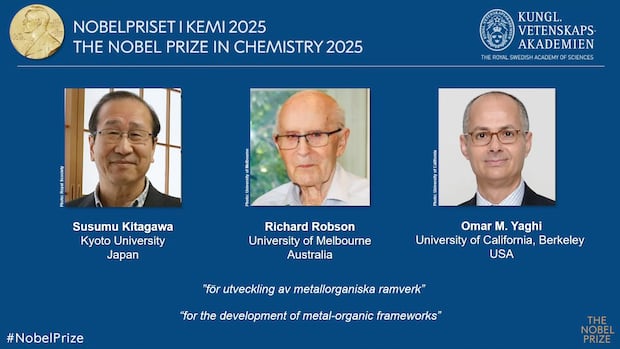Three scientists, Susumu Kitagawa, Richard Robson, and Omar Yaghi, have been awarded the 2025 Nobel Prize in Chemistry for their groundbreaking work in creating a new type of molecular architecture. This innovation has led to the development of materials that can address pressing issues such as climate change and water scarcity.
The laureates collaborated to design molecular structures with large cavities that allow gases and chemicals to pass through. These materials have diverse applications, including extracting water from arid environments, capturing carbon dioxide, and storing harmful gases. The Nobel Committee highlighted the exceptional surface area of these materials, noting that a small amount of porous material could have the same surface area as a large football field.
Olof Ramstrom, a member of the Nobel Committee for Chemistry, likened the material’s storage capacity to Hermione’s magical handbag from the Harry Potter series, emphasizing its ability to store vast amounts of gas in a compact space. The scientists’ achievements, spanning several years starting in 1989, have paved the way for significant advancements in various fields.
Kitagawa, 74, a professor at Kyoto University in Japan, expressed deep gratitude for the prestigious award and shared his aspiration to utilize renewable energy to convert captured air components like carbon dioxide and water into valuable resources. One promising application of their work is in carbon capture within the cement industry, a major emitter of global carbon dioxide.
Metal-organic frameworks (MOFs) derived from their research are already being implemented in cement plants to capture carbon emissions before their release. Chemists have since developed thousands of different MOFs with potential applications in addressing environmental challenges such as removing toxic chemicals from water and degrading pharmaceutical residues.
Yaghi, 60, who grew up in Jordan as a child of Palestinian refugees, emphasized the transformative power of science in his life journey. As a professor at the University of California-Berkeley, he expressed his astonishment and joy at receiving the Nobel Prize. Yaghi credited his early fascination with molecules, sparked by a library book at age 10, as the catalyst for his enduring passion for chemistry.
Robson, now 88 and a professor at the University of Melbourne, received the award at his home in Victoria, Australia. Despite health precautions, he celebrated the honor with a glass of wine, breaking his alcohol abstinence. The Nobel Chemistry Prize, which includes a monetary award of 11 million Swedish crowns (approximately $1.6 million CAD), is part of the prestigious series of Nobel Prizes recognizing exceptional contributions in various fields.
The Nobel Prizes, encompassing physics, chemistry, literature, and peace, culminate in a grand ceremony on December 10, commemorating the legacy of Alfred Nobel, the Swedish inventor and philanthropist.



